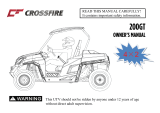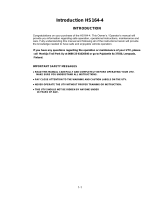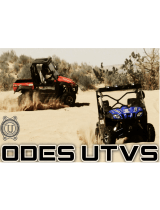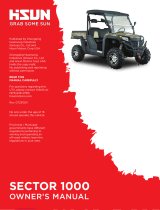Massimo T-BOSS410 CAMO User manual
- Category
- Offroad Vehicle
- Type
- User manual
This manual is also suitable for

WARNING:
Read this Manual,
and any
Supplements
Carefully
Before Operating
Vehicle.
Assembly
Operation
Maintenance
THIS VEHICLE IS
NOT DESIGENED
FOR USE ON
RENTAL TRACKS
OR RACING
OWNER’S/OPERATOR’S
MANUAL
US 18.0
T-Boss410
Type: golf cart
(Independent Rear Suspension)
BEFORE OPERATING THIS VEHICLE, THE OWNER AND EACH OPERATOR
MUST HAVE READ AND HAVE AN UNDERSTANDING OF ALL THE
INSTRUCTIONS FOR PROPER ASSEMBLY AND SAFE OPERATION, AS
WELL AS THE INSTRUCTIONS CONCERNING THE ENGINE AND ALL OTHER
PORTIONS OF THE VEHICLE.

T-Boss410 OWNER’S/OPERATOR’S MANUAL 18.0
1. INTRODUCTION
1- 1
Introduction
Congratulations on the purchase of your Cargo Utility Vehicle (UTV).
We take pride in offering you this product engineered and manufactured
to the highest performance and quality standards. We are sure that you
will enjoy superior levels of performance, reliability, riding comfort, and
safety.
This manual is provided to help the owner and operators of this UTV
become familiar with the operating characteristic, and the many
features offered on the UTV. The manual also covers information on the
care and maintenance of your UTV.
Please read this manual carefully. The information contained in this
Owner’s Manual, the Warning Labels supplied with this product will help
you to understand the safe use and maintenance of your UTV. Make
sure that you understand and follow all Warnings and Instructions in this
material.
If you did not receive any of the material listed above, please call your
dealer and request to have them sent to you.

T-Boss410 OWNER’S/OPERATOR’S MANUAL 18.0
1. INTRODUCTION
1- 2
Important Safety Notice
●This vehicle is designed and manufactured for off-road use.
●Check the laws and regulations in force before choosing where to
operate this vehicle. It is illegal to operate this vehicle on public lands
where vehicles its size are prohibited.
● Never make any modifications to the engine, drive system,
mechanical or electrical systems of your UTV. Never install aftermarket
parts or accessories intended to increase the speed or power of your
UTV.
●Failure to follow these warnings increases the possibility of accidents
leading to DEATH or SERIOUS INJURY!
● Additionally, failure to follow these requirements will void the
Warranty on your UTV.
NOTE
The addition and use of certain accessories including, (but not limited to)
mowers, blades, sprayers, winches and windshields will change the
handling characteristics and the performance of your UTV.
Practice Responsible UTV Riding
Make sure that you understand and follow all local, state/province, and
federal/national riding laws and requirements.
Remember……Respect your vehicle, respect the environment and
respect the property of others. You are responsible for your safety and
the safety of others around you when you ride!

T-Boss410 OWNER’S/OPERATOR’S MANUAL 18.0
1. INTRODUCTION
1- 3
A UTV CAN BE HAZARDOUS TO OPERATE. A UTV handles
differently from other vehicles including motorcycles, ATVs and cars. A
collision rollover can occur quickly, even during routine maneuvers such
as turning and driving on hills or over obstacles, if you fail to take proper
precautions.
SERIOUS INJURY OR DEATH can result if you do
not follow these instructions.
Read this manual and all labels carefully and follow the operating
procedures described.
This vehicle is designed to carry the driver and one passenger.
Never carry passengers in the cargo bed.
Always be sure the driver and passenger are wearing seat belts.
Never allow anyone who is not an adult to operate this UTV.
Never permit a guest to operate this UTV unless the guest has read
this manual and all product labels.
The driver and passenger must wear approved off-road motorcycle
-type helmets that fits properly. The driver and passenger should
also wear eye protections (goggles or face shields), gloves, boots,
long-sleeved shirts or jackets, and long pants.
As with any off-road-capable vehicle, there is a risk of tip over or
rollover under certain conditions. Uneven terrain or slopes which
pitch the vehicle sideways, turning too fast or sharp, or a
combination of conditions increase the risk of tip over.
If you are in a situation where the vehicle is tipping over, do not put
your arm or/ and leg outside the vehicle, do not try to stop tipping
with your arm or leg. You could be severely injured. You could suffer
a crushed hand, arm, leg, or foot, if part of your body is caught
underneath the vehicle.
You must keep your arms and legs inside the vehicle until it has
stopped moving.
Never consume alcohol or drugs before or while operating this UTV.
Never operate at excessive speeds. Always travel at a speed which
is proper for the terrain, visibility and operating conditions, and your
experience.
Never attempt wheelies, jumps or other stunts.
Always inspect your UTV each time you use it to make sure it is in

T-Boss410 OWNER’S/OPERATOR’S MANUAL 18.0
1. INTRODUCTION
1- 4
safe operating condition. Always follow the inspection and
maintenance procedures and schedules described in this manual.
Always keep both hands, arms, feet, and legs inside the vehicle at
all times during operation. Keep your feet on the floorboard. Never
hold onto the enclosure except when using the handgrip inside the
enclosure. Otherwise, your hand could be injured if it is caught
between the enclosure and an obstacle outside the vehicle.
Always keep both hands on the steering wheel when driving.
Never wrap your thumbs and fingers around the steering wheel.
This is particularly important when driving in rough terrain. The front
wheels will move right and left as they respond to the terrain, and
this movement will be felt in the steering wheel. A sudden jolt could
wrench the steering wheel around, and your thumbs or fingers
could be injured if they are in the way of the steering wheel spokes.
Always go slowly and be extra careful when operating on unfamiliar
terrain. Always be alert to changing terrain conditions when
operating the UTV.
Never operate on excessively rough, slippery or loose terrain.
Always follow proper procedures for turning as described in this
manual. Practice turning at low speeds before attempting to turn at
faster speeds. Do not turn at excessive speed.
Always have the UTV checked by an authorized dealer if it has
been involved in an accident.
Never operate UTV on hills too steep for the UTV or for your
abilities. Practice on smaller hills before attempting larger hills.
Always follow proper procedures for climbing hills as described in
this manual. Check the terrain carefully before you start up any hill.
Never climb hills with excessively slippery or loose surfaces. Never
open throttle suddenly or make sudden gear changes. Never go
over the top of any hill at high speed.
Always follow proper procedures for going down hills and for
braking on hills as described in this manual. Check the terrain
carefully before you start down any hill. Never go down a hill at high
speed. Avoid going down a hill at an angle which would cause the
vehicle to lean sharply to one side. Go straight down the hill where
possible.
Always follow proper procedures for crossing the side of a hill as
described in this manual. Avoid hills with excessively slippery or
loose surfaces. Never attempt to turn the UTV around on any hill.

T-Boss410 OWNER’S/OPERATOR’S MANUAL 18.0
1. INTRODUCTION
1- 5
Avoid crossing the side of a steep hill if possible.
Always use proper procedures if you stall or roll backwards when
climbing a hill. To avoid stalling, maintain a steady speed when
climbing a hill. If you stall or roll backwards, follow the special
procedure for braking described in this manual.
Always check for obstacles before operating in a new area. Never
attempt to operate over large obstacles, such as large rocks or
fallen trees. Always follow proper procedures when operating over
obstacles as described in this manual.
Always be careful of skidding of sliding. On slippery surfaces, such
as ice, go slowly and be very cautious in order to reduce the chance
of skidding or sliding out of control.
Avoid operating the UTV through deep or fast flowing water. Avoid
water which exceeds the recommended maximum depth. Go slowly,
carefully avoiding sudden movements, maintain a slow and steady
forward motion, do not make sudden turns or stops, and do not
make sudden throttle changes.
Wet brakes may have reduced stopping ability. Test your brakes
after leaving water. If necessary apply them lightly several times to
let friction dry out the pads.
Always be sure there are no obstacles or people behind you when
you operate in reverse. When it is safe to proceed in reverse, go
slowly. Avoid turning at sharp angles in reverse.
Always use the size and type tires specified in this manual. Always
maintain proper tire pressure as described in this manual.
Never modify A UTV through improper installation or use of
accessories
Never exceed the stated load capacity. Cargo should be as far
forward in the bed as possible, and distributed evenly from side to
side. Be sure cargo is secured so that it cannot move around during
operation. Reduce speed and follow instructions in this manual for
carrying cargo or pulling a trailer. Allow greater distance for braking.

T-Boss410OWNER’S/OPERATOR’S MANUAL 18.0
2. UNDERSTANDING WARNINGS
2- 1
ATTENTION:
This is an ADULT VEHICLE ONLY! Not a toy! READ AND
UNDERSTAND WARNINGS AND OWNER’S MANUAL BERORE
OPERATION.
KNOW YOUR VEHICLE BEFORE YOU BEGING RIDING!
Read this manual thoroughly referring to the various areas which are
being discussed on your machine. Operating this vehicle carries with it
responsibilities for your personal safety, the safety of others, and the
protection of our environment.
NOTE: Illustrations used in this manual are for general representation
only. Your model may differ.

T-Boss410OWNER’S/OPERATOR’S MANUAL 18.0
2. UNDERSTANDING WARNINGS
2- 2
SAFETY ALERT
WARNINGS identify special instructions or procedures which, if
not correctly followed, could result in personal injury, or loss of
life. Read all WARNINGS in this manual care fully. Follow their
instructions to remain safe.
The following precautionary signal words are used throughout this
manual to convey the following messages:
This is the safety alert symbol. When you see
this symbol on your machine or in this manual, be
alert to the potential for personal injury. Your safety is
involved!
WARNING
Indicates a potential hazard which could result in severe injury or
death.
CAUTION
Indicates a potential hazard which may result in minor personal
injury or damage to the UTV.
CAUTION
Indicates a situation that can result in damage to the machine.
NOTE The word “NOTE” in this manual will alert you to key
information or instructions.

T-Boss410 OWNER’S/OPERATOR’S MANUAL 18.0
3. SAFETY WARNING
3- 1

T-Boss410 OWNER’S/OPERATOR’S MANUAL 18.0
3. SAFETY WARNING
3- 2
NOTE:
Warning decals have been placed on the vehicle for your protection.
Read and follow the instructions on each decal carefully. In the event
any decal becomes illegible or comes off, contact your dealer for a
replacement.
NOTE: No.2 ONLY FOR 4WD
Attention: There is a risk of fire from driving the vehicle on the
ground where grass has dried up or parking the vehicle on such
surface while the engine is hot.

T-Boss410 OWNER’S/OPERATOR’S MANUAL 18.0
3. SAFETY WARNING
3- 3
1.
1
2

T-Boss410 OWNER’S/OPERATOR’S MANUAL 18.0
3. SAFETY WARNING
3- 4
3 4
5
6

T-Boss410 OWNER’S/OPERATOR’S MANUAL 18.0
3. SAFETY WARNING
3- 5
7 8
9
10

T-Boss410 OWNER’S/OPERATOR’S MANUAL 18.0
3. SAFETY WARNING
3- 6
11
12
13

T-Boss410 OWNER’S/OPERATOR’S MANUAL 18.0
3. SAFETY WARNING
3- 7
14

T-Boss410 OWNER’S/OPERATOR’S MANUAL 18.0
4. DAILY PRE-RIDE INSPECTION
4-1
WARNING
You must inspect your UTV each time before riding to ensure it is in
proper working order. If proper inspection is not done, severe injury or
death could result.
Use the following checklist to verify your machine is in proper working
order each time you ride.
ITEM/ INSPECTION PROCEDURE
1, Tire— check condition and pressures.
2, Fuel tank— checking for leaking, fill the fuel tank to its proper lever.
3, All brakes — check fluid level, check operation, adjustment
(includes parking brake).
● Brake pedal
Check for correct brake pedal free play. If the brake pedal free play is
incorrect, have an authorized dealer adjust it. Check the operation of
the brake pedal. It should move smoothly and there should be a firm
feeling when the brakes are applied. If not, have the vehicle inspected
by your dealer.
● Brake fluid leakage
Check to see if any brake fluid is leaking out of the pipe joints or the
brake fluid reservoir. Apply the brakes firmly for one minute. If there is
any leakage, have the vehicle inspected by an authorized dealer.
Brake fluid level
● Check the brake fluid level.
Add fluid if necessary.
● Brake operation
Test the brakes at slow speed after starting out to make sure they are
working properly. If the brakes do not provide proper braking
performance, inspect the brake system.
4, Throttle/ Accelerator pedal— check for free operation, closing and
freeplay.
Check to see that the accelerator pedal operates correctly. It must
operate smoothly and fully spring back to the idle position when
released.

T-Boss410 OWNER’S/OPERATOR’S MANUAL 18.0
4. DAILY PRE-RIDE INSPECTION
4-2
Have an authorized dealer repair as necessary for proper operation.
5, Headlight / Taillight / Brake light— check operation of all indicator
lights and switches.
6, Engine stop switch— check for proper function.
7, Wheels— check for tightness of wheel nuts and axle nuts; check
those axle nuts are secured by cotter pins.
Check balance/ damage/ runout. Have an authorized dealer repair/
replace if necessary.
Check bearing assemblies for looseness/damage. Have an authorized
dealer replace if damaged.
8, Air cleaner element— check for dirt; clean or replace.
9, Steering— check for free operation noting any unusual looseness in
any area.
Park on level ground. Turn the steering wheel right and left. Check for
excessive free play, abnormal noises, or a rough feeling. Have an
authorized dealer repair as necessary for proper operation.
10, Loose parts — visually inspect vehicle for any damaged
components or loose nuts/bolts or fasteners.
Always check the tightness of chassis fittings and fasteners before a
ride. Take the vehicle to your dealer for correct tightening torque.
11, Operator’s and passenger’s helmets, goggles and clothing.
12, Engine coolant— check for proper level at the recovery bottle.
13, Seat belts— Check for proper operation and belt wear.
Make sure that both seat belts are not frayed or damaged. The seat belt
must move smoothly when pulled out and retract on its own when
released. The latch plate should click securely into the buckle and
release when the release button is pushed firmly. Clean off any dirt or
mud which could affect operation. Have an authorized dealer repair as
necessary for proper operation.

T-Boss410 OWNER’S/OPERATOR’S MANUAL 18.0
5. OPERATION WARNINGS
5-1
WARNING
POTENTIAL HAZARD
Improper handling of gasoline.
WHAT CAN HAPPEN
Gasoline can catch fire and you could be burned.
HOW TO AVOID THE HAZARD
Always turn off the engine when refueling. Do not refuel right after the
engine has been running and is still very hot. Do not spill gasoline on
the engine or exhaust pipe/muffler when refueling. Never refuel while
smoking, or while in the vicinity of sparks, open flames, or other sources
of ignition such as the pilot lights of water heaters and clothes dryers.
WARNING
POTENTIAL HAZARD
Checking the fuel system while smoking or near an open flame.
WHAT CAN HAPPEN
Fuel can ignite or explode, causing severe injury or property
damage.
HOW TO AVOID THE HAZARD
Do not smoke when checking the fuel system. Make sure there
are no open flames or sparks in the area, including pilot lights
from water heaters or furnaces.

T-Boss410 OWNER’S/OPERATOR’S MANUAL 18.0
5. OPERATION WARNINGS
5-2
WARNING
POTENTIAL HAZARD
When transporting the vehicle in another vehicle, be sure it is kept in an
upright position. Otherwise, fuel may leak out of the carburetor or fuel
tank.
WHAT CAN HAPPEN
Gasoline is poisonous and can cause injuries.
HOW TO AVOID THE HAZARD
If you should swallow some gasoline or inhale a lot of gasoline vapor,
or get some gasoline in your eyes, see your doctor immediately. If
gasoline spills on your skin, wash with soap and water. If gasoline spills
on your clothing, change your clothes.
WARNING
POTENTIAL HAZARD
Changing from 2WD to 4WD or vice-versa while the vehicle is moving.
WHAT CAN HAPPEN
The vehicle handles differently in 2WD than in 4WD, or vice-vers a while
moving may cause the vehicle to unexpectedly handle differently. This
could distract the operator and increase the risk of losing control and an
accident.
HOW TO AVOID THE HAZARD
Always stop the vehicle before changing from 2WD to 4WD, or
vice-versa.

T-Boss410 OWNER’S/OPERATOR’S MANUAL 18.0
5. OPERATION WARNINGS
5-3
WARNING
POTENTIAL HAZARD
Malfunction of the accelerator pedal.
WHAT CAN HAPPEN
The accelerator pedal could be hard to operate, making it difficult to
speed up or slow down when you need to. This could cause an
accident.
HOW TO AVOID THE HAZARD
Check the operation of the accelerator pedal before you start the
engine. If it does not work smoothly, check for the cause. Correct the
problem before operating the vehicle. Consult an authorized dealer if
you can’t find or solve the problem yourself.
WARNING
POTENTIAL HAZARD
A loose seat.
WHAT CAN HAPPEN
The operator could lose control or the operator or passenger could fall
if the seat is loose during operation.
HOW TO AVOID THE HAZARD
Make sure the seat is securely latched.
WARNING
POTENTIAL HAZARD
Not wearing the seat belt.
Wearing the seat belt improperly.
WHAT CAN HAPPEN
There is increased risk of being killed or seriously injured in an accident.
HOW TO AVOID THE HAZARD
Always wear your seat belt when riding in the vehicle.
Be sure the seat belt is close-fitting across your hips and chest and is
latched securely.
Page is loading ...
Page is loading ...
Page is loading ...
Page is loading ...
Page is loading ...
Page is loading ...
Page is loading ...
Page is loading ...
Page is loading ...
Page is loading ...
Page is loading ...
Page is loading ...
Page is loading ...
Page is loading ...
Page is loading ...
Page is loading ...
Page is loading ...
Page is loading ...
Page is loading ...
Page is loading ...
Page is loading ...
Page is loading ...
Page is loading ...
Page is loading ...
Page is loading ...
Page is loading ...
Page is loading ...
Page is loading ...
Page is loading ...
Page is loading ...
Page is loading ...
Page is loading ...
Page is loading ...
Page is loading ...
Page is loading ...
Page is loading ...
Page is loading ...
Page is loading ...
Page is loading ...
Page is loading ...
Page is loading ...
Page is loading ...
Page is loading ...
Page is loading ...
Page is loading ...
Page is loading ...
Page is loading ...
Page is loading ...
Page is loading ...
Page is loading ...
Page is loading ...
Page is loading ...
Page is loading ...
Page is loading ...
Page is loading ...
Page is loading ...
Page is loading ...
Page is loading ...
Page is loading ...
Page is loading ...
Page is loading ...
Page is loading ...
Page is loading ...
Page is loading ...
Page is loading ...
Page is loading ...
Page is loading ...
Page is loading ...
Page is loading ...
Page is loading ...
Page is loading ...
Page is loading ...
Page is loading ...
Page is loading ...
Page is loading ...
Page is loading ...
Page is loading ...
Page is loading ...
Page is loading ...
Page is loading ...
Page is loading ...
Page is loading ...
Page is loading ...
Page is loading ...
Page is loading ...
Page is loading ...
Page is loading ...
Page is loading ...
Page is loading ...
Page is loading ...
Page is loading ...
Page is loading ...
Page is loading ...
Page is loading ...
Page is loading ...
Page is loading ...
Page is loading ...
Page is loading ...
Page is loading ...
Page is loading ...
Page is loading ...
Page is loading ...
Page is loading ...
Page is loading ...
Page is loading ...
Page is loading ...
Page is loading ...
Page is loading ...
Page is loading ...
Page is loading ...
Page is loading ...
Page is loading ...
-
 1
1
-
 2
2
-
 3
3
-
 4
4
-
 5
5
-
 6
6
-
 7
7
-
 8
8
-
 9
9
-
 10
10
-
 11
11
-
 12
12
-
 13
13
-
 14
14
-
 15
15
-
 16
16
-
 17
17
-
 18
18
-
 19
19
-
 20
20
-
 21
21
-
 22
22
-
 23
23
-
 24
24
-
 25
25
-
 26
26
-
 27
27
-
 28
28
-
 29
29
-
 30
30
-
 31
31
-
 32
32
-
 33
33
-
 34
34
-
 35
35
-
 36
36
-
 37
37
-
 38
38
-
 39
39
-
 40
40
-
 41
41
-
 42
42
-
 43
43
-
 44
44
-
 45
45
-
 46
46
-
 47
47
-
 48
48
-
 49
49
-
 50
50
-
 51
51
-
 52
52
-
 53
53
-
 54
54
-
 55
55
-
 56
56
-
 57
57
-
 58
58
-
 59
59
-
 60
60
-
 61
61
-
 62
62
-
 63
63
-
 64
64
-
 65
65
-
 66
66
-
 67
67
-
 68
68
-
 69
69
-
 70
70
-
 71
71
-
 72
72
-
 73
73
-
 74
74
-
 75
75
-
 76
76
-
 77
77
-
 78
78
-
 79
79
-
 80
80
-
 81
81
-
 82
82
-
 83
83
-
 84
84
-
 85
85
-
 86
86
-
 87
87
-
 88
88
-
 89
89
-
 90
90
-
 91
91
-
 92
92
-
 93
93
-
 94
94
-
 95
95
-
 96
96
-
 97
97
-
 98
98
-
 99
99
-
 100
100
-
 101
101
-
 102
102
-
 103
103
-
 104
104
-
 105
105
-
 106
106
-
 107
107
-
 108
108
-
 109
109
-
 110
110
-
 111
111
-
 112
112
-
 113
113
-
 114
114
-
 115
115
-
 116
116
-
 117
117
-
 118
118
-
 119
119
-
 120
120
-
 121
121
-
 122
122
-
 123
123
-
 124
124
-
 125
125
-
 126
126
-
 127
127
-
 128
128
-
 129
129
-
 130
130
-
 131
131
-
 132
132
Massimo T-BOSS410 CAMO User manual
- Category
- Offroad Vehicle
- Type
- User manual
- This manual is also suitable for
Ask a question and I''ll find the answer in the document
Finding information in a document is now easier with AI
Related papers
Other documents
-
 gio Little Chief Owner's manual
gio Little Chief Owner's manual
-
 Hisun HS1P65MM User manual
Hisun HS1P65MM User manual
-
 ODES Dominator Owner's manual
ODES Dominator Owner's manual
-
Baja BO250 UTV Owner's manual
-
Toro Twister Utility Vehicle User manual
-
Toro Twister 1600 Utility Vehicle User manual
-
Toro Twister 1600 Utility Vehicle User manual
-
Toro 12004TC Twister 1600 User manual
-
Toro Twister 1600 Utility Vehicle User manual
-
 Hisun VECTOR 1000 Owner's manual
Hisun VECTOR 1000 Owner's manual











































































































































